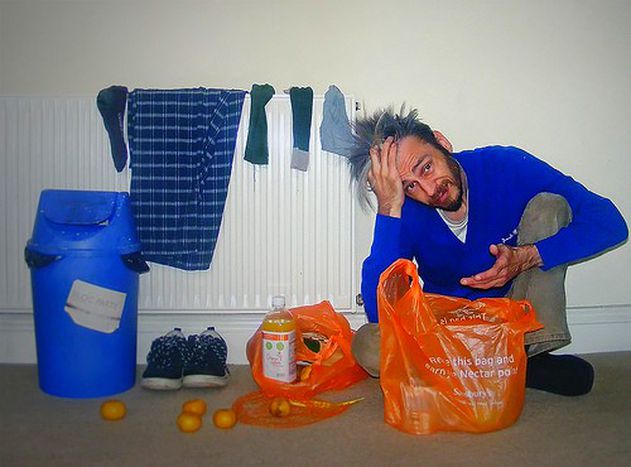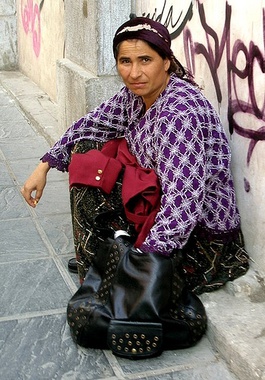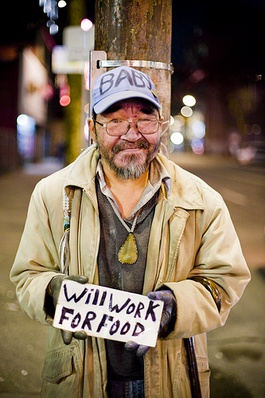
Minimum European income to fight poverty?
Published on
Translation by:
James FrisciaGiven persistent shortcomings of minimum wage policies, legislators and organisations instead debate the merits of ‘minimum income’ to combat poverty in Europe. But it remains to be seen whether the EU parliament will force continent-wide reforms
The European Union aims to be the most competitive economy in the world by 2020. Yet, 85 million of its citizens - 17% of the population - are considered to be at risk of poverty because their income is less than 60% of their country’s average national income. Risk of social exclusion can be even higher, especially for youths (20%) and for people over 65 (19%).
Minimum income: essential to combat poverty?
For this reason, the European parliament’s employment and social affairs committee is deliberating over a report on the role of minimum income in the fight against poverty and social exclusion. The report, presented by the Portuguese MEP Ilda Figueiredo of the confederal group of the European united left, asserts that a minimum income is 'essential' to combat poverty. Additionally, special emphasis is placed on the role it can play for the highest risk groups, such as women, immigrants and single-parent or large families.
In 2008, the EU parliament passed a resolution on this, but without full authority to enforce it in the member states. This time, in the context of the themed 'European year against poverty and social exclusion' and the grave economic crisis, the government may take a much stronger stance. Debates take place on whether this proposal will become an official decree, in that member states would be obliged to make social and employment reforms.
EU minimum wage? No, a universal income
 Of the key figures involved in the debate over this report, Rebeka Smith of Businesseurope (the confederation of European business) affirms that while 'employment has to be viewed as one of the prerequisites for combating poverty,' unemployment is only one of the principal issues. Given the proliferation of precarious jobs and low wages, 8% of workers still approach poverty despite earning salaries. For this reason, it is important to clarify that the proposal does not refer to minimum salary, which is at present either dramatically different between countries - from 123 euros or £106 in Bulgaria, up to 1642 euros or £1, 415 in Luxembourg, or 769 euros or £663 in Spain, according to 2009 EU figures. In countries like Italy or Cyprus it doesn't even exist! Instead, it focuses on the minimum income that people should be entitled to receive in order to perceive that they live with dignity, independent of their employment status. The proposal speaks of a universal income which is applicable to all citizens and is not contributive, i.e. requiring periodic payments to a fund, as with insurance.
Of the key figures involved in the debate over this report, Rebeka Smith of Businesseurope (the confederation of European business) affirms that while 'employment has to be viewed as one of the prerequisites for combating poverty,' unemployment is only one of the principal issues. Given the proliferation of precarious jobs and low wages, 8% of workers still approach poverty despite earning salaries. For this reason, it is important to clarify that the proposal does not refer to minimum salary, which is at present either dramatically different between countries - from 123 euros or £106 in Bulgaria, up to 1642 euros or £1, 415 in Luxembourg, or 769 euros or £663 in Spain, according to 2009 EU figures. In countries like Italy or Cyprus it doesn't even exist! Instead, it focuses on the minimum income that people should be entitled to receive in order to perceive that they live with dignity, independent of their employment status. The proposal speaks of a universal income which is applicable to all citizens and is not contributive, i.e. requiring periodic payments to a fund, as with insurance.
Minimum income would guarantee a level of financial refuge to people who could not obtain it without help. The concept of minimum income already exists in some countries, and the figures speak for themselves: in Sweden, the Netherlands and Spain 98% of the population can consume a full diet each day. In Bulgaria this percentage only comes to 70%, 71% in Slovakia and 74% in Hungary. The minimum level would definitely need to be adjusted to the specifications of each country. Yet, in general it seeks to augment the possibility that all European citizens would have things as simple as sufficient housing or adequate nutrition each day, independent of where they live.
 There are already organisations devoted to making this a reality. Another key figure involved in the debate, the Brussels-based European anti-poverty network (EAPN), founded in 1990, recently launched a campaign in favour of minimum income. On the website of their initiative there is support from people such as the Danish president of the European socialists group Poul Nyrup Rasmussen, and the French vice-president of the committee of the regions (CoR, a European institution), Michel Delebarre. Members of the greens have also rallied in favour of the initiative. Échos d'euro-écolos ('Echoes from European ecology party members') is one blog run by two young MEPs of the party, Karima Delli and Pascal Canfin, defends not just a minimum, but also a maximum income. For now, it is just one report of the employment and social affairs committee (EMPL) with a first discussion to be held on 28 April. The various parties will submit their amendments on 1 July and on the 24th they will incorporate them into the committee’s report. The adoption in the plenary session of the European parliament is scheduled for October. Therefore, it remains to be seen what the council says. It is too early to know if the initiative will go forward or if the interests of the different member states will stand in its way. We will stay tuned.
There are already organisations devoted to making this a reality. Another key figure involved in the debate, the Brussels-based European anti-poverty network (EAPN), founded in 1990, recently launched a campaign in favour of minimum income. On the website of their initiative there is support from people such as the Danish president of the European socialists group Poul Nyrup Rasmussen, and the French vice-president of the committee of the regions (CoR, a European institution), Michel Delebarre. Members of the greens have also rallied in favour of the initiative. Échos d'euro-écolos ('Echoes from European ecology party members') is one blog run by two young MEPs of the party, Karima Delli and Pascal Canfin, defends not just a minimum, but also a maximum income. For now, it is just one report of the employment and social affairs committee (EMPL) with a first discussion to be held on 28 April. The various parties will submit their amendments on 1 July and on the 24th they will incorporate them into the committee’s report. The adoption in the plenary session of the European parliament is scheduled for October. Therefore, it remains to be seen what the council says. It is too early to know if the initiative will go forward or if the interests of the different member states will stand in its way. We will stay tuned.
Images: ©Arty Smokes; ©Landahlauts; ©Mananetwork/ courtesy of Flickr
Translated from ¿Una renta mínima europea para luchar contra la pobreza?



